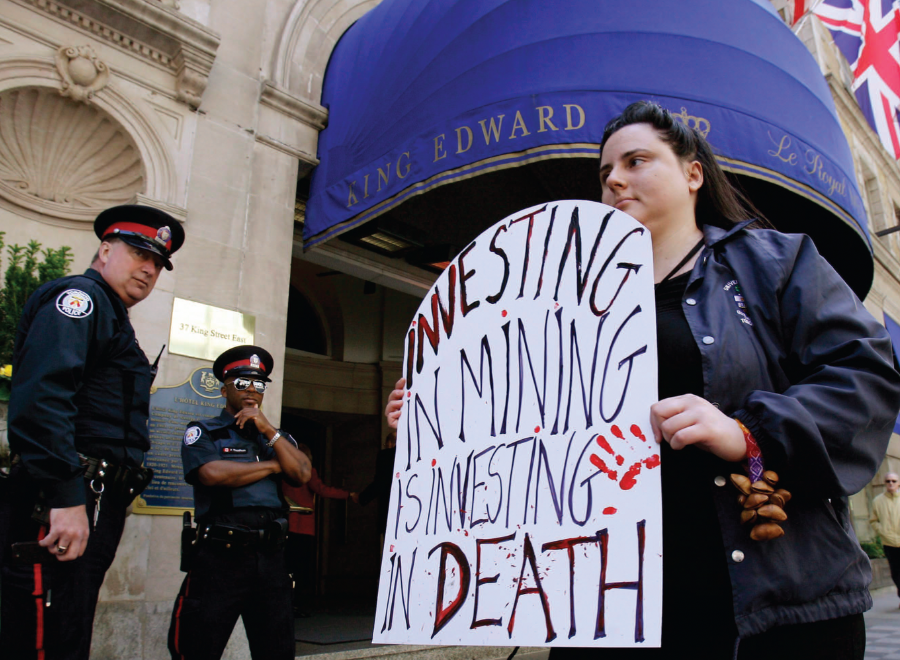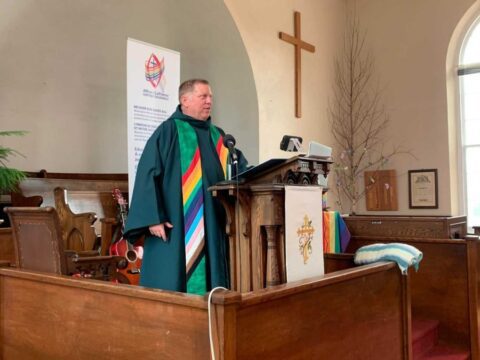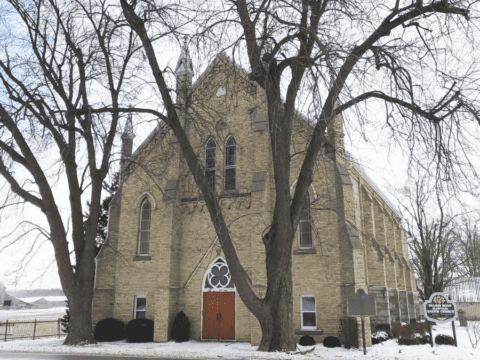For the past two years, the United Church’s pension holdings in a Canadian mining company accused of environmental and human rights abuses in Guatemala have been a flashpoint in a wider debate about responsible investment.
At the last General Council meeting in 2009, commissioners voted to take a closer look at pension fund investments in Goldcorp. The company’s Marlin Mine in Guatemala has continued to operate despite a suspension order last July from the Inter-American Commission on Human Rights. Mayan Mam people living near the site have faced violence and harassment for speaking out against the project. As recently as late February, several demonstrators were beaten by pro-mine groups following peaceful protests at two mine entrances.
You may unsubscribe from any of our newsletters at any time.
Despite the mounting controversy, however, the pension fund still owns about $5.8 million worth of Goldcorp shares. While the Pension Board argues that it’s better to maintain ownership and try to persuade the company to improve its record, church activists continue to urge the Board to sell its shares. “We’re in the crazy position of making money out of things that we have said we are standing against, and we have no credibility,” says retired minister and overseas worker Rev. Faye Wakeling.
How big is this issue? No fewer than three groups have been formed to review the church’s responsible investment practices. Separate committees are looking at policies for both the $1-billion pension fund and General Council’s $129-million reserve funds. A third planned working group, with members from across General Council’s Aboriginal, financial, partnership and mission units, will examine responsible investment generally and mining issues specifically.
Church staff hope the committees’ research and resulting policies will bring investors and activists closer together. General Council’s head of financial services, Bill Kennedy, says that while “the actual aims of the different investment groups differ,” the work now under way should foster agreement “on the basic principles and what responsible investing means. Because this is an area where there’s a lot of interpretation.”
At the very least, the groups’ work should help church people better understand the difficulty of making money with a clean conscience.
So what is responsible investment — also called ethical, sustainable or socially responsible investment?
For Bill Davis, former financial officer of the United Church and a leader of the church-based corporate responsibility movement in the 1970s and ’80s, it’s a stewardship issue. “Whatever assets you have or bring to the world, you are responsible for how they are used,” he says. “Owning shares means you’re part-owner of the company and you have a say in electing directors. You ought to look at that and ask, ‘Am I comfortable getting a share of the profits? Am I comfortable with how the profits are produced?”
The first step in responsible investing is straightforward: set criteria that screen out certain industries. The most recent United Church policy, approved in 2006, bans investment in companies involved in gambling or production of alcohol, pornography, tobacco and weapons. The second step is more problematic: select well-managed, profitable companies that provide a good return but still adhere to high environmental and human rights standards, treat employees well and make safe products. Then, monitor them to ensure they don’t stray.
If they do, a process of engagement comes next: talk to the company’s management and try to get questionable practices corrected. Like any shareholder, the church can speak at companies’ annual meetings. If concerns aren’t addressed, it can launch a share- holder proposal on an issue. And if there’s still no progress, the proposal can go to a vote.
Faced with a recalcitrant company or a widespread, seemingly intractable issue— like apartheid in South Africa during the late 1980s — the church can choose to divest. It’s seen as a last resort among responsible investors, however. “If you sell, you lose your voice,” says Pension Board chair Charlie Black.
In the 1970s and ’80s, Canadian churches involved in the ecumenical Taskforce on the Churches and Corporate Responsibility (TCCR) were perennial boardroom gadflies, pressing companies in which the churches held shares to improve their performance on Aboriginal, environmental, human rights and corporate governance issues.
After leading the way as advocates and agents of responsible investment in Canada, however, churches have been outpaced in the past decade by the private sector. While ethical funds gained mainstream popularity and shareholders began to exert pressure over issues of concern, the churches’ active involvement in responsible investment was shrinking. In a funding crunch about 10 years ago, TCCR and other ecumenical coalitions were folded into the new agency KAIROS: Canadian Ecumenical Justice Initiatives. KAIROS continues to address corporate accountability on environmental and human rights issues but doesn’t do the detailed research and engagement needed for responsible investment.
By contrast, TCCR’s American sibling, the Interchurch Center on Corporate Responsibility, is still thriving, with multiple staff, more than 70 members and even more institutional and individual associates. It reports that assets in socially responsible funds grew 324 percent from 1995 to 2007, reaching $2.7 trillion.
Around the same time as KAIROS replaced TCCR, General Council staff investment managers were laid off and their work outsourced to secular investment managers. Then in 2004, the General Council Office transferred control of pension fund investments to the newly formed Pension Board, a shift made to better address pension regulations and isolate pension funds from lawsuits filed against the church.
Between those changes and continuing budget pressure, General Council has had little direct involvement in responsible investment in recent years.
For Bill Davis, that’s disappointing. “In the past five years, there’s been this huge uproar over executive compensation,” he says. “Here’s an ethical issue: How can anyone be worth 60 to 75 times an average wage? Not a peep from the church.”
He is hopeful that new talk about responsible investing will change that.
The Pension Board’s current guiding principles allow for socially responsible investment procedures, “provided there is reasonable assurance that the best long-term interest of the members is being serviced.” Made up largely of volunteers with financial expertise, the Pension Board has oversight of the fund’s day-to-day investment activities but has spent up to $70,000 a year to hire analysts, such as Jantzi-Sustainalytics, to screen and monitor its investments. That company first alerted the Pension Board in 2008 to Goldcorp’s human rights performance in Guatemala.
In response, the Board hired another consultant, SHARE (Shareholder Association for Research and Education), to engage Goldcorp on a variety of issues, including labour relations, environmental and water concerns, and compliance with a recent human rights assessment.
Last fall, the Board also hired the consulting firm Glass Lewis to help it decide how to use proxy votes for the shares it holds. Up to that point, those decisions were left to the professional investors who managed pension investments.
Without a current policy on whether or how it should vote on social or environmental matters, the Pension Board did not support a shareholder proposal from a church activist that came to a vote at Goldcorp’s annual meeting last May. Acting on behalf of the Maritime Breaking the Silence (BTS) network, a Guatemala solidarity group and ecumenical mission partner of the United Church’s Maritime Conference, diaconal minister Kathryn Anderson and BTS member Brenda Cooper called on the company to commit to getting the “free, prior and informed consent” of Aboriginal communities for mining exploration and operations.
Goldcorp has about 1.5-billion out-standing shares, but even without United Church backing, the proposal gained the support of 10 percent of shares or proxies voted. Anderson believes the proposal was supported by some U.S.-based ethical fund investors.
In the face of criticism over its Goldcorp holdings, the church Pension Board may be moving toward a more active approach to responsible investment. A Board sub-committee is now reviewing detailed policy on applying responsible investment practices.
Similarly, instead of continuing to rely on passive screening processes to weed out problem investments, an off- shoot of General Council’s permanent finance committee is developing new policies for the church’s general and reserve funds with a strong emphasis on responsible investment.
Mining concerns will get special attention from the United Church’s newly minted working group looking at responsible investment, resource extraction and“issues raised around wealth creation.” Joy Kennedy, the General Council staff person leading the group, says its work will include ethical and theological reflection, evaluation of current policy and practices, and new ways the church can take action. She hopes it will promote a more unified approach to the issues. “It’s about how we can have a more concerted effort on this, so everybody’s on the same page,” she says.
She also hopes the group’s work will encourage people across the church to take a fresh look at corporate responsibility in Canada and what they and their church can do as responsible investors. In the end, she says, “all we have really is moral suasion. But, really, that is the business we are in.”
***
This story first appeared in The United Church Observer’s April 2011 issue with the title “Profit versus principle.”














